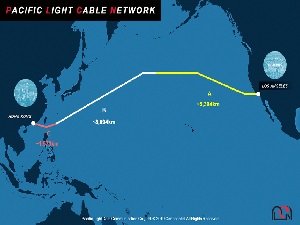A plan to connect Los Angeles and Hong Kong via an underwater data cable has been scrapped due to concerns from the US government that the Chinese government could siphon information from it.
The Pacific Light Cable Network (PLCN), which was partly owned by Facebook and Google, will now only operate between the United States, Taiwan and the Philippines, according to documents submitted to the Federal Communications Commission (FCC).
Nearly 13,000 kilometres of the underwater cable had already been laid since the plans were announced in 2016, but it required permission from the FCC to operate.
Hong Kong company Pacific Light Data Co (PLDC) owns all of the remaining pairs and acts as the landing party in Hong Kong, and is a subsidiary of Dr Peng Group.
It was expected to handle 120 terabytes of data per second between Los Angeles and Hong Kong, which Google claimed was enough for 80 million high-definition conference calls.
“We can confirm that the original application for the PLCN cable system has been withdrawn, and a revised application for the US-Taiwan and US-Philippines portions of the system has been submitted,“ a spokesperson for Google told the BBC.
“We continue to work through established channels to obtain cable landing licenses for our undersea cables.”
The decision is not unexpected. A US government committee recommended to the FCC in June that the cable should not connect to Hong Kong, citing concerns about the involvement of Chinese company Dr. Peng Telecom.
The committee’s claimed that the Chinese government would seek to acquire the personal data of millions of US citizens through digital infrastructure, as well as arguing that Dr. Peng Telecom would be obligated to work with the Chinese government under its intelligence and cybersecurity laws.


